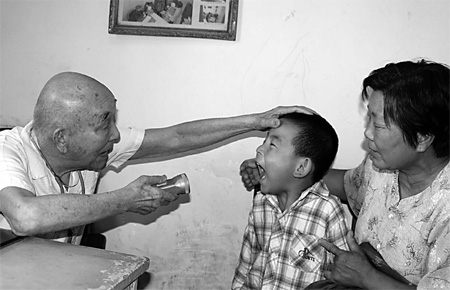|
|

The 101-year-old Hiroshi Yamasaki checks the throat of a boy at his clinic in Jinan, Shandong province. Ju Chuanjiang
|
A very, very old doctor greets a few young patients and their parents inside his small private clinic. The quiet man gently smiles, nods to the children, strokes their heads and asks them to open their mouths wide as he checks their throats. The doctor is nearly deaf, but still works three hours in the morning six days a week, treating up to 20 children every day. One of them is 8-year-old Li Qingshuai, whose family had already spent more than 10,000 yuan ($1,460) in a desperate bid to treat her continuous fever.
After only three visits and paying just 60 yuan for the right medicine prescribed by the old man, the girl has quickly recovered.
Good news stories like this one happen almost every day at the doctor's clinic in Jinan, capital city of East China's Shandong province.
If you did not know him, one might never realize this frail fellow, with a strong Jinan accent, is actually, according to local media, the very last Japanese war veteran still living in China since the War of Resistance against Japanese Aggressions (1937-45).
Among the locals today Hiroshi Yamasaki is known as Dr Shan and he has lived in Jinan for some 70 years.
Yamasaki only spent six months serving in the Japanese army as a veterinarian before he escaped and after the war decided to stay in China to atone for the conduct of Japan's invaders.
"I hate wars and I couldn't bear our troop's brutality to the Chinese people," Yamasaki says.
The peace-loving doctor didn't join the invading troops willingly.
The Japanese imperial government required every family to send a son to join the army and being the youngest son in his family, the then 29-year-old, single doctor had no choice but to join the army, so his older married brother could remain with his new family.
He was first dispatched to Tianjin and soon witnessed the evil of war.
One horrific scene he recalls was witnessing a Japanese soldier strangling a Chinese baby.
Yamasaki desperately tried to save the infant but failed.
"That incident strengthened my determination to leave the army," he says.
He deserted his troops in the middle of the night and walked east, hoping to reach the coast and find a way back to Japan. Four days later, the starving young man collapsed.
He woke up to find himself in an impoverished Chinese farmer's family. When he was strong enough to walk again, the aged couple gave him the only set of clothes they had. They were simple threads but were washed.
With the only flour they still had, the couple made a pancake for Yamasaki to take on the road.
When the old doctor recalls the couple's kindness he cannot hold back the tears.
"They knew I was Japanese but still saved my life," Yamasaki says as he weeps. "I couldn't do anything for them except bow."
More Chinese helped him along his way, and Yamasaki finally made his way to Jinan, where he found a job as a storehouse keeper at the Japanese-controlled railway, using a different name.
He secretly helped poverty-stricken Chinese workers steal the daily necessities to survive.
|